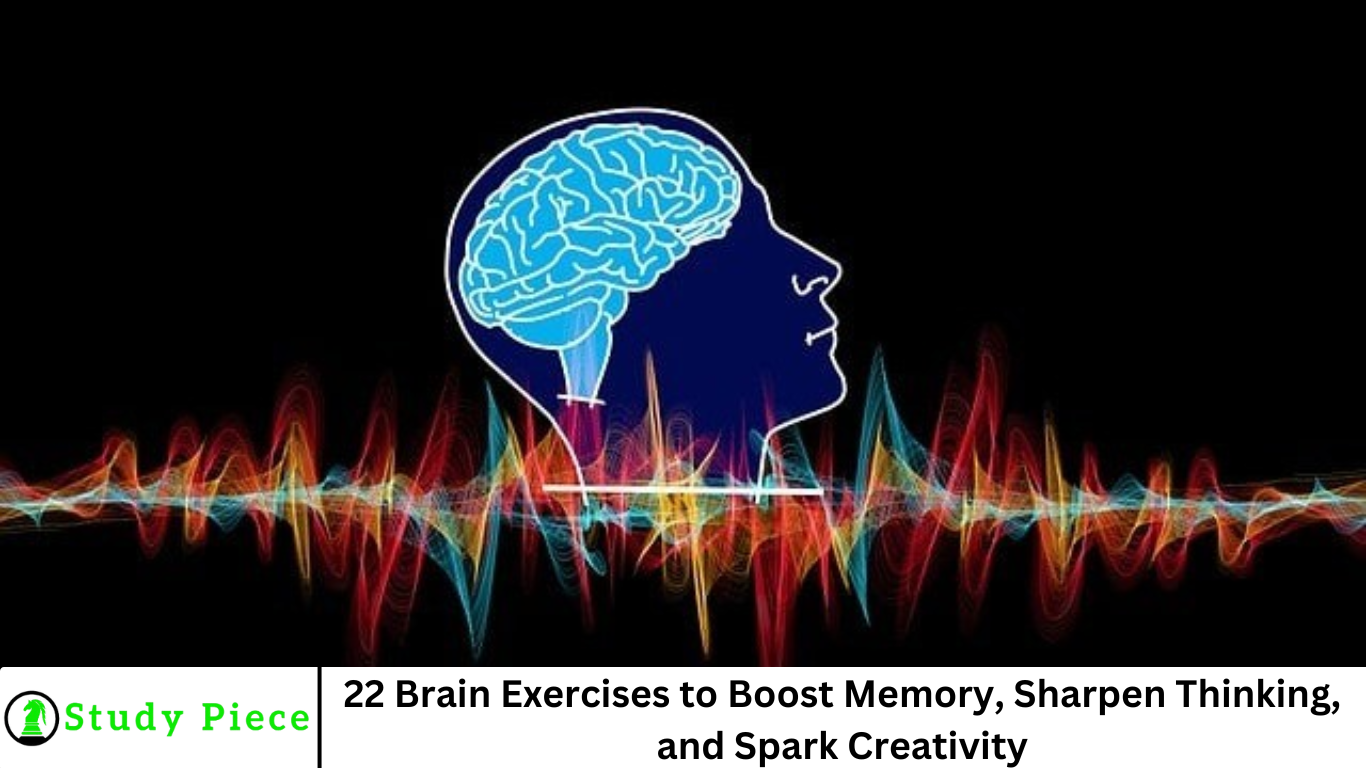In a fast-paced, digital-first world, mental clarity and creativity are more important than ever. Whether you’re a student, professional, or lifelong learner, training your brain can lead to sharper thinking, improved memory, and greater creativity.
The good news? You don’t need expensive tools—just commitment and a few effective techniques. Here are 22 brain exercises that will help boost your mental agility, enhance memory, and ignite your creative spark.
More Read: Key Facts About Using Meditation to Improve Focus
Why Brain Exercises Matter
Your brain is like a muscle—the more you challenge it, the stronger it becomes. Studies show that mental stimulation helps:
- Prevent cognitive decline
- Improve problem-solving skills
- Enhance focus and attention
- Promote neuroplasticity (the brain’s ability to reorganize and form new connections)
By regularly practicing brain-boosting activities, you can build cognitive resilience and stay mentally sharp at any age.
22 Brain Exercises to Sharpen Your Mind
1. Try Brain Teasers and Puzzles
Sudoku, crossword puzzles, and logic games challenge your reasoning skills and short-term memory. Just 15 minutes a day can make a big difference.
2. Learn a New Language
Learning a new language improves memory, enhances attention, and increases gray matter in the brain. Apps like Duolingo or Babbel make it easy and fun.
3. Meditate Daily
Mindfulness meditation strengthens the prefrontal cortex, improves emotional regulation, and sharpens focus. Start with just 5-10 minutes a day.
4. Read Diverse Content
Reading fiction enhances empathy and creativity, while nonfiction expands knowledge. Switch genres regularly to activate different areas of the brain.
5. Play a Musical Instrument
Playing music boosts memory, coordination, and spatial reasoning. Even casual practice stimulates neural connections and creativity.
6. Take a Different Route
Change your daily routine—try a new route to work or rearrange your furniture. This disrupts autopilot thinking and builds new neural pathways.
7. Practice Visualization
Close your eyes and visualize a scene in detail. This mental imagery technique improves memory recall and creative thinking.
8. Write by Hand
Writing by hand engages more brain regions than typing. Keep a journal, write letters, or sketch out ideas to boost cognitive function.
9. Learn to Juggle
Juggling increases hand-eye coordination and brain connectivity. It’s a physical and mental challenge that enhances focus and concentration.
10. Memorize Phone Numbers or Poems
Challenge your memory by learning phone numbers, poems, or historical facts. Repetition strengthens neural connections and recall ability.
11. Switch Hands
Use your non-dominant hand for tasks like brushing teeth or eating. This builds new motor pathways and enhances brain flexibility.
12. Practice Mindful Observation
Choose an object and observe it for 2-3 minutes. Describe it in detail in your mind. This improves focus and awareness.
13. Play Strategy Games
Games like chess, Go, or even video games that require planning and strategy stimulate problem-solving and logical reasoning.
14. Take Brain Training Apps for a Spin
Apps like Lumosity, Elevate, or Peak offer science-backed games designed to enhance memory, attention, and cognitive speed.
15. Engage in Debate or Discussion
Conversations that challenge your views stimulate critical thinking and flexible reasoning. Join a club or group to practice regularly.
16. Learn a New Skill
Whether it’s painting, coding, or photography, acquiring a new skill strengthens the brain’s ability to adapt and grow.
17. Practice Deep Listening
Focus entirely on what someone is saying—without interrupting or preparing your response. This sharpens focus and empathy.
18. Do Mental Math
Skip the calculator! Try calculating tips, budgets, or measurements in your head. This enhances numerical reasoning and memory.
19. Watch Educational Videos or Documentaries
Engage with new ideas and knowledge by watching informative content on topics outside your usual interests.
20. Solve Riddles
Riddles force the brain to think outside the box and develop abstract reasoning. Try solving a few each morning to jumpstart your mind.
21. Doodle or Sketch
Drawing engages creative thinking and spatial reasoning. Let your mind wander on paper—it’s a fun way to spark innovation.
22. Take Regular Breaks
Ironically, one of the best brain exercises is rest. Step away from work every 60-90 minutes to reset your mind and improve long-term productivity.
How to Make Brain Training a Habit
Consistency is key when it comes to brain training. Here are a few tips to help you stay on track:
- Set Daily Goals: Even 10–15 minutes of mental exercise can be effective.
- Mix It Up: Rotate through different types of exercises to activate all areas of your brain.
- Track Your Progress: Use journals or apps to log activities and improvements.
- Combine Activities: Try pairing mental challenges with physical ones—like listening to educational podcasts during a walk.
The Science Behind Brain Exercises
Cognitive exercises work because they promote neuroplasticity—the brain’s ability to form and reorganize synaptic connections, especially in response to learning or experience. As we age, neural networks can weaken, but consistent mental challenges help build resilience and even slow cognitive decline.
According to a study published in Frontiers in Human Neuroscience, individuals who engage in regular mental stimulation show better memory, attention, and even improved IQ scores over time.
Frequently Asked Question
What are the best brain exercises to improve memory?
The best brain exercises for memory include puzzles (like Sudoku and crosswords), memorizing lists or poems, practicing visualization, and learning new skills such as a language or musical instrument. These activities strengthen memory recall and improve cognitive retention.
How often should I do brain exercises to see results?
Consistency is key. Aim for at least 15–30 minutes of brain training daily. Regular practice over weeks or months leads to noticeable improvements in focus, memory, and creativity.
Can brain exercises really improve creativity?
Yes, certain exercises like doodling, writing by hand, playing music, and brainstorming new ideas stimulate the brain’s creative centers. Creativity improves when you challenge your mind with novel and abstract thinking.
Do brain exercises help prevent cognitive decline?
Studies suggest that engaging in regular mental stimulation may reduce the risk of cognitive decline and delay the onset of memory-related conditions like Alzheimer’s. Activities that promote neuroplasticity are especially beneficial as we age.
Are there apps that help with brain training?
Yes, apps like Lumosity, Elevate, Peak, and BrainHQ offer science-backed games designed to boost memory, attention, and problem-solving skills. These tools are great for daily practice and tracking progress.
Can physical activity also enhance brain function?
Absolutely. Physical exercise increases blood flow to the brain, improves mood, and supports the growth of new neural connections. Activities like yoga, walking, or learning to juggle combine physical movement with mental focus.
How can I make brain training a consistent habit?
Start small—just 10–15 minutes a day. Set a routine, use reminders or apps, and keep it fun by mixing activities. Choose challenges you enjoy to stay motivated and make mental fitness part of your daily lifestyle.
Conclusion
Your brain thrives on variety, challenge, and novelty. By incorporating these 22 brain exercises into your daily life, you’ll boost memory, sharpen cognitive skills, and unlock your creative potential. Whether you’re looking to stay mentally sharp as you age or simply want to think more clearly and creatively, these simple habits can make a profound difference. Start small, stay curious, and keep challenging your mind—because a stronger brain leads to a smarter, more inspired life.



